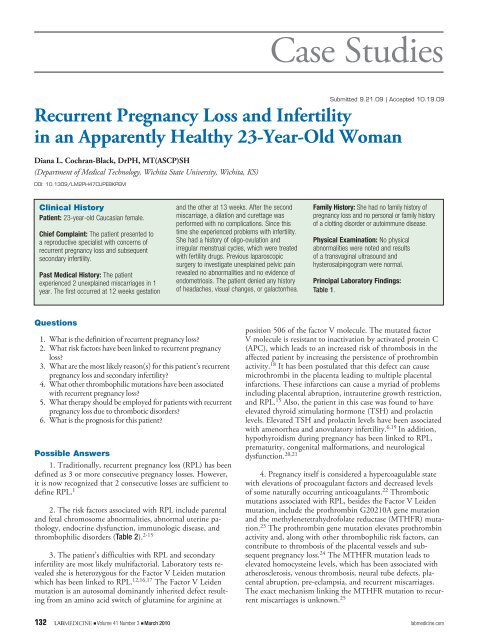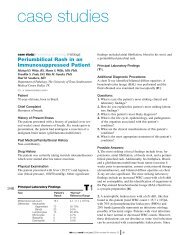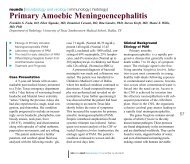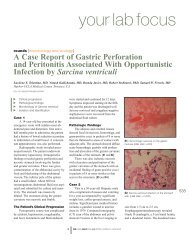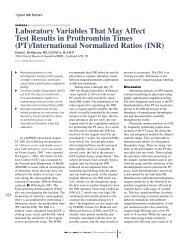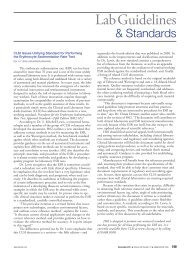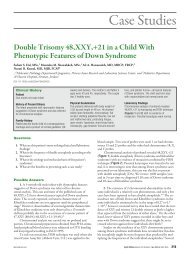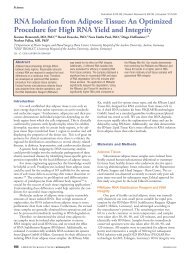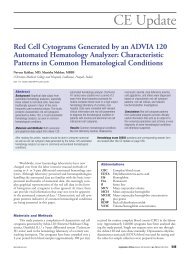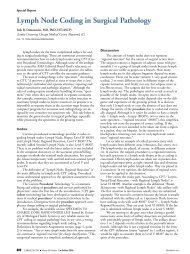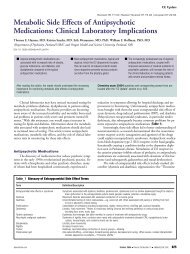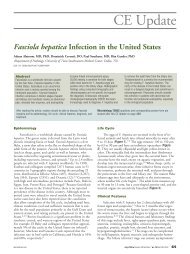Case Studies - LabMedicine
Case Studies - LabMedicine
Case Studies - LabMedicine
Create successful ePaper yourself
Turn your PDF publications into a flip-book with our unique Google optimized e-Paper software.
<strong>Case</strong> <strong>Studies</strong><br />
Recurrent Pregnancy Loss and Infertility<br />
in an Apparently Healthy 23-Year-Old Woman<br />
Diana L. Cochran-Black, DrPH, MT(ASCP)SH<br />
(Department of Medical Technology, Wichita State University, Wichita, KS)<br />
DOI: 10.1309/LM2PH47CUPEBKPEM<br />
Submitted 9.21.09 | Accepted 10.19.09<br />
Clinical History<br />
Patient: 23-year-old Caucasian female.<br />
Chief Complaint: The patient presented to<br />
a reproductive specialist with concerns of<br />
recurrent pregnancy loss and subsequent<br />
secondary infertility.<br />
Past Medical History: The patient<br />
experienced 2 unexplained miscarriages in 1<br />
year. The first occurred at 12 weeks gestation<br />
and the other at 13 weeks. After the second<br />
miscarriage, a dilation and curettage was<br />
performed with no complications. Since this<br />
time she experienced problems with infertility.<br />
She had a history of oligo-ovulation and<br />
irregular menstrual cycles, which were treated<br />
with fertility drugs. Previous laparoscopic<br />
surgery to investigate unexplained pelvic pain<br />
revealed no abnormalities and no evidence of<br />
endometriosis. The patient denied any history<br />
of headaches, visual changes, or galactorrhea.<br />
Family History: She had no family history of<br />
pregnancy loss and no personal or family history<br />
of a clotting disorder or autoimmune disease.<br />
Physical Examination: No physical<br />
abnormalities were noted and results<br />
of a transvaginal ultrasound and<br />
hysterosalpingogram were normal.<br />
Principal Laboratory Findings:<br />
Table 1.<br />
Questions<br />
1. What is the definition of recurrent pregnancy loss?<br />
2. What risk factors have been linked to recurrent pregnancy<br />
loss?<br />
3. What are the most likely reason(s) for this patient’s recurrent<br />
pregnancy loss and secondary infertility?<br />
4. What other thrombophilic mutations have been associated<br />
with recurrent pregnancy loss?<br />
5. What therapy should be employed for patients with recurrent<br />
pregnancy loss due to thrombotic disorders?<br />
6. What is the prognosis for this patient?<br />
Possible Answers<br />
1. Traditionally, recurrent pregnancy loss (RPL) has been<br />
defined as 3 or more consecutive pregnancy losses. However,<br />
it is now recognized that 2 consecutive losses are sufficient to<br />
define RPL. 1<br />
2. The risk factors associated with RPL include parental<br />
and fetal chromosome abnormalities, abnormal uterine pathology,<br />
endocrine dysfunction, immunologic disease, and<br />
thrombophilic disorders (Table 2). 2-15<br />
3. The patient’s difficulties with RPL and secondary<br />
infertility are most likely multifactorial. Laboratory tests revealed<br />
she is heterozygous for the Factor V Leiden mutation<br />
which has been linked to RPL. 12,16,17 The Factor V Leiden<br />
mutation is an autosomal dominantly inherited defect resulting<br />
from an amino acid switch of glutamine for arginine at<br />
position 506 of the factor V molecule. The mutated factor<br />
V molecule is resistant to inactivation by activated protein C<br />
(APC), which leads to an increased risk of thrombosis in the<br />
affected patient by increasing the persistence of prothrombin<br />
activity. 18 It has been postulated that this defect can cause<br />
microthrombi in the placenta leading to multiple placental<br />
infarctions. These infarctions can cause a myriad of problems<br />
including placental abruption, intrauterine growth restriction,<br />
and RPL. 15 Also, the patient in this case was found to have<br />
elevated thyroid stimulating hormone (TSH) and prolactin<br />
levels. Elevated TSH and prolactin levels have been associated<br />
with amenorrhea and anovulatory infertility. 6,19 In addition,<br />
hypothyroidism during pregnancy has been linked to RPL,<br />
prematurity, congenital malformations, and neurological<br />
dysfunction. 20,21<br />
4. Pregnancy itself is considered a hypercoagulable state<br />
with elevations of procoagulant factors and decreased levels<br />
of some naturally occurring anticoagulants. 22 Thrombotic<br />
mutations associated with RPL, besides the Factor V Leiden<br />
mutation, include the prothrombin G20210A gene mutation<br />
and the methylenetetrahydrofolate reductase (MTHFR) mutation.<br />
23 The prothrombin gene mutation elevates prothrombin<br />
activity and, along with other thrombophilic risk factors, can<br />
contribute to thrombosis of the placental vessels and subsequent<br />
pregnancy loss. 24 The MTHFR mutation leads to<br />
elevated homocysteine levels, which has been associated with<br />
atherosclerosis, venous thrombosis, neural tube defects, placental<br />
abruption, pre-eclampsia, and recurrent miscarriages.<br />
The exact mechanism linking the MTHFR mutation to recurrent<br />
miscarriages is unknown. 25<br />
132 LABMEDICINE ■ Volume 41 Number 3 ■ March 2010 labmedicine.com
<strong>Case</strong> <strong>Studies</strong><br />
5. The therapy of choice for women<br />
with thrombotic tendencies before and during<br />
pregnancy includes low dose aspirin and<br />
either unfractionated (UHF) or low molecular<br />
weight heparin (LMWH). 26-28<br />
6. The prognosis for this patient is very<br />
good. Patients with RPL due to thrombotic<br />
tendencies that are treated with aspirin and<br />
heparin have a 72%–80% chance of having a<br />
successful pregnancy outcome. 28,29<br />
Patient’s Treatment and Follow Up<br />
The patient’s hypothyroidism was well<br />
controlled with Synthroid. Bromocriptine was<br />
used to lower her prolactin level. She conceived<br />
spontaneously and due to her history<br />
of RPL and the Factor V Leiden mutation,<br />
she was placed on daily, low-dose aspirin and<br />
LMWH therapy. The aspirin therapy was discontinued<br />
early in the pregnancy due to vaginal<br />
bleeding. Her pregnancy was uneventful,<br />
and she recently delivered a healthy baby.<br />
Acknowledgements: The author wishes to<br />
express her appreciation to the patient and Dr.<br />
Tiffany VonWald for providing permission to<br />
access medical records and to the laboratory<br />
staff at the Center for Reproductive Medicine<br />
for their assistance with this case study.<br />
Keywords: recurrent pregnancy loss, thrombophilia,<br />
infertility, Factor V Leiden mutation,<br />
activated protein C resistance, thrombophilic<br />
gene mutations<br />
Table 1_Laboratory Findings<br />
Test Patient’s Result “Normal” Reference Range<br />
Lupus anticoagulant reflex<br />
PTT-LA(s) 36.2 0.0-50.0 seconds<br />
dRVVT(s) 38.5 0.0-44.5 seconds<br />
Phosphatidylserine antibodies<br />
IgM 13 0-25 MPS IgM<br />
IgG 4 0-11 GPS IgG<br />
APTT Mixing studies<br />
APTT 26.4 23.4-36.4 seconds<br />
APTT 1:1 normal plasma 26.1 23.4-36.4 seconds<br />
APTT 1:1 mix saline 28.4 0.0-37.0 seconds<br />
APTT 1:1 NP mix, 60 min. incubation 27.6 23.4-36.4 seconds<br />
APTT 1:1 mix NP incubation mix Ctl 28.3 23.4–36.4 seconds<br />
Anticardiolipin antibodies<br />
IgG
<strong>Case</strong> <strong>Studies</strong><br />
1. Practice Committee of the American Society for Reproductive Medicine.<br />
Definitions of infertility and recurrent pregnancy loss. Fertil Steril.<br />
2008;89:1603.<br />
2. Carp HJ. Recurrent miscarriage: Genetic factors and assessment of the embryo.<br />
IMAJ. 2008;10:229–231.<br />
3. Migeon BR. Non-random X chromosome inactivation in mammalian cells.<br />
Cytogenet Cell Genet. 1998;80:142–148.<br />
4. Porter TF, Scott JR. Evidence-based care of recurrent miscarriage. Best Pract<br />
Res Clin Obstet Gynaecol. 2005;19:85–101.<br />
5. Abalovich M, Gutierrez S, Alcaraz G, et al. Overt and subclinical<br />
hypothyroidism complicating pregnancy. Thyroid. 2002;12:63–68.<br />
6. Kalro BN. Impaired infertility caused by endocrine dysfunction in women.<br />
Endocrinol Metab Clin North Am. 2003;32:573–592.<br />
7. Craig LB, Ke RW, Kutteh WH. Increased prevalence of insulin resistance<br />
in women with a history of recurrent pregnancy loss. Fertil Steril.<br />
2002;78:487–490.<br />
8. Hanson U, Persson B, Thunell S. Relationship between hemoglobin A1C<br />
in early type 1 (insulin dependent) diabetic pregnancy and the occurrence<br />
of spontaneous abortion and fetal malformation in Sweden. Dibetologia.<br />
1990;33:100–104.<br />
9. Szekeres-Bartho J, Balasch J. Progesterone therapy for recurrent pregnancy<br />
loss. Hum Reprod Update. 2008;14:27–35.<br />
10. Lin PC. Reproductive outcomes in women with uterine anomalies. J Women<br />
Reprod Health. 2004;13:33–39.<br />
11. Pihusch R, Buchholz T, Lohse P, et al. Thrombophilic gene mutations and<br />
recurrent spontaneous abortion: Prothrombin mutation increases the risk in<br />
the first trimester. AJRI. 2001;46;124–131.<br />
12. Glueck CJ, Gogenini S, Munjal J, et al. Factor V Leiden mutation: A treatable<br />
etiology for sporadic and recurrent pregnancy loss. Fertil Steril. 2008;89:410–<br />
416.<br />
13. Ornoy A, Chen L, Silver RM, et al. Maternal autoimmune diseases and<br />
immunologically induced embryonic and fetoplacental damage. Birth Defects<br />
Res A Clin Mol Teratol. 2004;70:371–381.<br />
14. Vinatier D, Dufour P, Cosson M, et al. Antiphospholipid syndrome and<br />
recurrent miscarriages. Eur J Obstet Gynecol Reprod Biol. 2001;96:37–50.<br />
15. Raziel A, Kornberg Y, Friedler R, et al. Hypercoagulable thrombophilic defects<br />
and hyperhomocysteinemia in patients with recurrent pregnancy loss. AJRI.<br />
2001;45:65–71.<br />
16. Rai R, Backos M, Elgaddal S, et al. Factor V Leiden and recurrent miscarriageprospective<br />
outcome of untreated pregnancies. Hum Reprod. 2002;17:442–<br />
445.<br />
17. Grandone D, Margaglione M, Colaizzo D, et al. Factor V Leiden is associated<br />
with repeated and recurrent unexplained fetal losses. Thromb Haemost.<br />
1997;77:822–24.<br />
18. Dahlback B. Activated protein C resistance and thrombosis: Molecular<br />
mechanisms of hypercoagulable state due to FVR506Q mutation. Semin<br />
Thromb Hemost. 1999;25:273–289.<br />
19. Hirahara U, Andoh N, Sawai K, et al. Hyperprolactinemic recurrent<br />
miscarriage and results of randomized bromocriptine treatment trials. Fertil<br />
Steril. 1998;70:246–252.<br />
20. Davis LB, Leveko KJ, Cunningham FG. Hypothyroidism complicating<br />
pregnancy. Obstet Gynecol. 1988;72:108–112.<br />
21. Haddow JE, Palomaki GE, Allan WC, et al. Maternal thyroid deficiency<br />
during pregnancy and subsequent neuropsychological development of the<br />
child. NEJM. 1999;341:549–555.<br />
22. Clark P, Brennand J, Conkle JA, et al. Activated protein C sensitivity,<br />
protein C, protein S and coagulation in normal pregnancy. Thromb Haemost.<br />
1998;79:1166–1170.<br />
23. Goodman CS, Coulam CB, Jeyendran RS, et al. Which thrombophilic gene<br />
mutations are risk factors for recurrent pregnancy loss? Am J Reprod Immunol.<br />
2006;56:230–236.<br />
24. Pihusch R, Buchholz T, Lohse P, et al. Thrombophilic gene mutations and<br />
recurrent spontaneous abortion: Prothrombin mutation increases the risk in<br />
the first trimester. AJRI. 2001;46:124–131.<br />
25. Unfried G, Griesmach A, Weismuller W, et al. The C677T polymorphism<br />
of the methylenetetrahydrofolate reductase gene and idiopathic recurrent<br />
miscarriage. Obstet Gynecol. 2002;99:614–619.<br />
26. Badaway AM, Khiary M, Sherril, LS, et al. Low-molecular weight heparin<br />
in patients with recurrent early miscarriages of unknown aetiology. J Obstet<br />
Gynaecol. 2008;28:280–284.<br />
27. Stephenson MD, Ballem PJ, Tsang P, et al. Treatment of antiphospholipid<br />
syndrome (APS) in pregnancy: A randomized pilot trial comparing low<br />
molecular weight heparin to unfractionated heparin. J Obstet Gynaecol Can.<br />
2004;26:729–734.<br />
28. Rai R, Cohen H, Dave M, et al. Randomized controlled trial of aspirin and<br />
aspirin plus heparin in pregnant women with recurrent miscarriage associated<br />
with phospholipid antibodies (or antiphospholipid antibodies). Br Med J.<br />
1997;31:253–257.<br />
29. Kutteh WH. Antiphospholipid antibody-associated recurrent pregnancy loss:<br />
Treatment with heparin and low-dose aspirin is superior to low dose aspirin<br />
alone. Am J Obstet Gynecol. 1996;174:1584–1589.<br />
134 LABMEDICINE ■ Volume 41 Number 3 ■ March 2010 labmedicine.com


